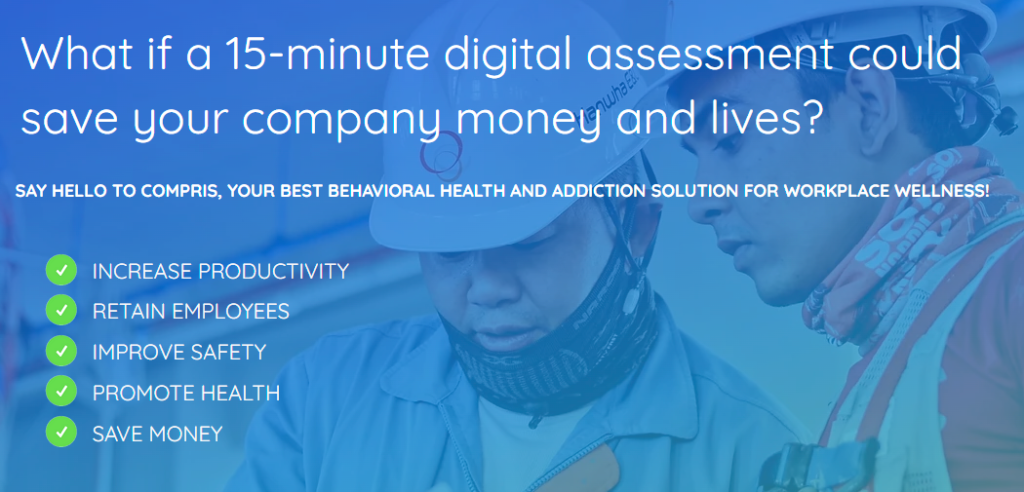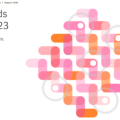Why is measuring risk and resilience at the heart of workplace wellness?
Workplace wellness is a hot topic in HR circles, especially post pandemic—so how do you measure wellness in your company? Moreover, how do your wellness programs help employees become more satisfied, do better work, and avoid critical accidents or injury?
These days, wellness has become a catchphrase without any teeth. Most programs look at the obvious—sleep, diet, and exercise. As important as these are, they ignore the more nuanced truth that includes motivation, readiness, and resilience needed for any behavior change to stick.
 Compris does things differently. As a prediction and prevention driven solution, our focus is risk and resilience. Using our proprietary BUILD® model, we can measure a person’s risk of developing behavioral health challenges, including addictions. But that’s only half the equation. Compris also identifies and measures employee resilience resources needed to effect and sustain lasting change for authentic wellness.
Compris does things differently. As a prediction and prevention driven solution, our focus is risk and resilience. Using our proprietary BUILD® model, we can measure a person’s risk of developing behavioral health challenges, including addictions. But that’s only half the equation. Compris also identifies and measures employee resilience resources needed to effect and sustain lasting change for authentic wellness.
Simply put, we measure where your employees are currently at, and what kind of programs and initiatives, self-guided or otherwise, it will take to help them feel and function better at home and at work.
Let’s use “Joe” as an example. He’s an IT Director at a mid-sized company. In the IT industry, companies lose an estimated $14,000 per year for each person with substance misuse, including nicotine and binge drinking. In the past, Joe’s performance was driven, productive, and inspirational to others. Lately, Joe has been having trouble showing up on time and focusing on routine tasks. He’s become less sociable at work, avoids interaction with coworkers and staff, and drinks after work to unwind.
Joe’s workplace sends out a benefits email with a link to Compris. Joe sees it and decides it’s worth a try. He takes the anonymous 15-minute assessment, accessible from any computer or mobile device. His results pop up on his screen almost immediately. When Joe gets his Compris wellness profile he’s surprised to see that he has a tendency for negative thinking, putting him at higher risk for nicotine, alcohol, opiates, and/or benzos. Joe is already a smoker. He can also see more clearly how his alcohol use has progressed and may be contributing to what he’s noticing at work.
Resilience factors are also part of Joe’s wellness profile. He sees several resources he’d forgotten about, that he can work on to counter what he’s experiencing. These include things like his sense of humor, the support of family and friends, and having more hobbies. Presented with his results, he realizes how much his risk factors and low resilience are affecting his work. Joe decides to seek help.
This is just one example of how Compris can empower employees to engage with their wellness and take advantage of workplace benefits to support them. Compris can be taken alone or with a provider, and Joe can repeatedly check his motivation and resilience progress. With more effective prevention, early intervention, and progress measures, Joe’s company can save $12,800 during his first year of recovery (per National Safety Council).
Compris can be activated in your company safely and anonymously. The key to cost effective and impactful employee wellness programming is early identification for prevention. If an issue is identified, resilience progress can optimize employee self-advocacy and growth.
Over 40% of people self-refer to treatment. The current path takes 17 years for most people to maintain recovery from an addiction. In the meantime, they and their employers continue to bear the burden of absenteeism, decreased productivity, turnover, and healthcare costs. A solution that looks at risk AND resilience, with next steps guidance like Compris, can shorten that time to a year or less.
The post-pandemic elephant in the room: PTSD, loneliness, depression, and employee dissatisfaction. 80% of those with addictions go to work everyday, and 20% of them struggle with substance misuse. Please join a LINKEDIN LIVE Event with Nicole Martin and Dr. Calvin McGinn, co-founder of Compris, to learn about a cutting-edge digital prediction and prevention-driven solution for substance misuse and employees at risk. Compris empowers employee self-awareness, measures mental health, substance misuse risk, and resilience. It offers a personalized path to improve job productivity, retention, and safety. It assists organizational leaders, managers, and decision makers interested in promoting prevention and wellness through early intervention. Compris also generates ongoing, aggregate data to better target employee assistance programs and offerings. Make sure this one’s on your calendar!
Tue, Apr 18, 2023, 11:00 AM – 12:00 PM
Learn about:
- The role resilience plays in lasting addiction recovery and your company’s employee wellness.
- How a 15-minute digital prevention and wellness assessment can help identify employees at risk for mental health and addiction struggles and save your company money.
- The benefits of adding prevention to your current wellness program.
Calvin McGinn, PhD, LMFT, RN, co-founder of Compris, Inc., is an ER care manager for Advocate Aurora Health and a family therapist. His extensive 40+ year career spans ER and pediatric nursing, care management, NAMI state trainer leadership, and teaching post-graduate medical education while co-chairing the National Forum for the Behavioral Sciences in Family Medicine. His expertise as a recovery coach, program director, and clinical researcher, lead to Compris, an evidence-based digital recovery and wellness assessment, prevention, and treatment guide.
Joyce Ann McGinn, BS, OTR/L, GCFP, Compris’ Co-Founder, has spent 25 years dedicated to her integrated healing practice. Her formal Occupational Therapy, Feldenkrais, and MNRI training bring a unique perspective and empathy for those with chronic pain, PTSD, and developmental delays. Joyce has researched the challenges surrounding the opioid crisis, and currently authors a blog to raise awareness of the comprehensive addiction care needs in the workplace and create avenues to reach people by creating partnerships with employee benefits wellness programs and providers.






